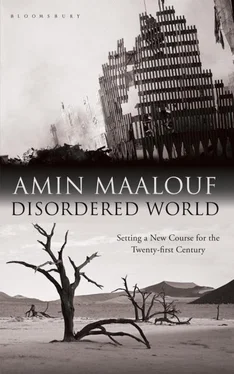Deciding whether to blame the age-old blindness of Arab societies or the age-old greed of Western powers matters little today. Both positions can be defended and I shall return to them. What is certain — and what weighs heavily on the world today — is that for several decades the secular, potentially modernising elements of the Arab-Muslim world fought against the West, and in so doing headed down a dead end materially and morally, and that the West fought back, often with devastating effectiveness, and sometimes with the support of Islamic religious movements.
This was not a true alliance, merely a tactical arrangement to confront a powerful common enemy. But it meant that at the end of the Cold War the Islamists were on the winning side. Their influence on daily life became visible and far-reaching in all areas. Now a large part of the population identified with them, all the more strongly as they adopted all the social and nationalist demands traditionally championed by the left and resistance movements. While it remained based on the clear application of the precepts of faith, often interpreted conservatively, Islamist discourse became politically radical: more egalitarian, more supportive of the Third World, more revolutionary and more nationalistic — and from the end of the twentieth century, resolutely hostile to the West and its protégés.
A comparison comes to mind in relation to this last point: in Europe, right-wing democrats and communists who had been allies against Nazism during the Second World War found themselves enemies in 1945. Likewise, it was predictable that at the end of the Cold War, the Islamists and the West would become implacable foes. If somewhere suitable for the touch paper to be lit was required, Afghanistan provided it. That was where these former allies were last united in battle against the Soviets; that was where, after their final victory in the last decade of the twentieth century, their breach became definitive; and it was from there that, on 11 September 2001, a deadly attack was launched against the US. The chain reaction which followed is well known — invasions, insurrections, executions, massacres, civil wars and countless further terrorist attacks.
The idea that the West is facing a handful of terrorists who take the name of Islam in vain and whose actions are condemned by the vast majority of believers doesn’t always match reality. It is true that monstrous acts of carnage, such as the one perpetrated in Madrid in March 2004, arouse feelings of disgust, awkwardness and sincere condemnation in the Muslim world. But if you look closely at the different ‘tribes’ which make up humanity today across our planet, their reactions to terror attacks, like those to armed conflicts and political shows of strength, are rarely the same: what causes some people to feel outrage may be justified, excused or even applauded by others.
We are obviously in the presence of two interpretations of history, which crystallise around different perceptions of ‘the enemy’. For some, Islam has shown itself incapable of adopting the universal values advocated by the West, while for others, the West above all possesses a will to universal domination, which Muslims have tried hard to resist with their limited remaining resources.
For someone able to listen to each ‘tribe’ in its own language, as I have done for many years, this spectacle is at once instructive, fascinating and depressing. For, as soon as you accept certain premises, everything can be interpreted coherently without needing to hear the other side’s opinion.
If, for example, you accept the conjecture that the great calamity of our time is the ‘barbarity of the Muslim world’, looking at Iraq will only confirm your view. You will see a bloody tyrant whose reign of terror lasted a third of a century; who slaughtered his own people and squandered their oil wealth on luxuries and military spending; who invaded his neighbours, defied the great powers, became increasingly boastful, to the delight of the Arab masses, before folding without putting up a real fight. Then, after his fall, watch as the country sinks into chaos and see the different communities begin to massacre each other, as if to say: ‘You see, it took a dictator to keep a people like this in line!’
If, on the other hand, you take the cynicism of the West for granted, events can be explained just as coherently: as a prelude there were sanctions, which plunged a whole nation into poverty and cost the lives of hundreds of thousands of children but didn’t ever deprive the dictator of his cigars. Next came an invasion, justified on a false premise and carried out in contempt of public opinion as well as international institutions, and motivated at least in part by the desire to gain control of Iraq’s oil resources. Then, following the US victory, there was the hasty and arbitrary dissolution of the Iraqi army and machinery of state, the explicit implantation of communitarianism within its institutions as if it had been decided to plunge the country deliberately into a state of permanent instability; and for good measure, the barbaric acts of Abu Ghraib prison, systematic torture, endless humiliation, collateral damage, innumerable blunders that have gone unpunished, looting, waste…
To some, the case of Iraq demonstrates that the Muslim world is impervious to democracy. To others, it reveals the true face of Western ‘democratisation’. Even in the footage of the death of Saddam Hussein, the ferocity of the Americans is as evident as that of the Arabs.
In my view, both positions are correct and both are wrong. Each follows its own orbit around its public, which grasps its subtleties but doesn’t hear the opposing side. As a result of my background and the course my life has taken, I ought to belong within each of these orbits at the same time, but I feel myself growing daily more distant from them both.
This feeling of ‘estrangement’ is not due to some desire to establish an equivalence of blame between these aspects of my identity. Nor is it due simply to my irritation at two types of cultural obstinacy which are poisoning the early years of this century — and which, incidentally, are contributing to destroying my native land. My criticism applies to the way both the West and the Arab world have behaved for many centuries and it even leads me to question their raison d’être. The essence of my idea is that both have reached the limits of what they could still achieve as separate civilisations; that they are both morally bankrupt, as are all the individual civilisations that still divide humanity; and that the moment has come to transcend them. Either we will find a way this century to build a common civilisation with which everyone can identify, bound together by the same universal values, guided by a powerful faith in the human adventure and enriched by all our cultural diversity, or else we will descend together into a common barbarism.
What I resented most about the Arab world was its lack of moral conscience, and what I resented most about the West was its propensity to turn its moral conscience into an instrument of domination. As a result, the West’s moral credibility was in perpetual decline and the Arabs’ moral credibility was practically non-existent.
Nonetheless, I don’t put the crises of ‘my’ two civilisations on the same level. Compared to what it was a thousand years ago, or three hundred, or even fifty, the West has undeniably experienced great advances, which on some levels are still going on and even accelerating. Meanwhile, the Arab world was at its lowest ebb, a cause of shame to its sons, its friends and its history.
One highly revealing example has been — and, unfortunately, still is — its ability to manage coexistence among its various religions and ethnic components. When I was young, relations between diverse Middle Eastern communities were still, if not egalitarian and fraternal, at least civil and decent. Sunni and Shia Muslims sometimes regarded each other with distrust, but intermarriage was common and the daily tit-for-tat massacres, which the Iraqi tragedy has made commonplace, would have been unthinkable.
Читать дальше












